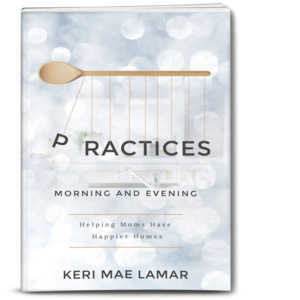Feb. 19, 2007
3:10 PM
A Simple Life
It is exasperating, excruciating, exhausting work to be a mother. But all things considered, it really is a simple life: love God, love your husband, love your children, keep the home. This is a life full enough, and anything else looms to threaten and steal precious emotional, mental, and physical strength from the limited time we really have to live. Someday, perhaps, my great-great-grand-daughter will wipe her brow, put the children to nap, and wonder about me, about how I “did it”. I will tell her, “not as well as I wanted, nor as much as I had hoped, but Jesus walked with me through it all, and that was more than enough.”
At this point, even with a decision and a commitment to home educate, the reality of such an endeavor sets in: who will do it? Simply asking the question, however, reveals the starting point: the starting point that says, “Children will not learn without an educator.” The fact is, children are learning all of the time, even within the cozy confines of the womb. Granted, they may be learning lessons you wished weren’t so intriguing or harmful, or they may be avoiding the harder and more satisfying pursuits of endeavoring to attempt new things, but they ARE learning.
In America’s post-industrial culture today, women are typically the homemakers and educators for the family. This is true, even if those women have outside careers to attend. Once home, they are thinking of meals, or laundry, or of dental appointments that need making. One could argue quite convincingly women were created to be nurturers, but even without a Biblical worldview, that is the gender that tends to oversee those tasks. Therefore, in this chapter I am going to address a topic that I have experience with: equipping and caring for the mother who is home educating. Men reading this chapter may find some helps for themselves if they are the primary teacher. I am certain that reading this will enable them to better support their wives in the endeavor.
Home educating mothers need to know everything that was discussed in the previous chapter, and know it by heart as well as by head: you do not need to be trained to teach your children. That being said, just like any other pursuit, gaining knowledge of the variety of methods gives a mother a plethora of tools to choose from, to best meet each child’s very unique needs. One child may love the structure of having a list of quality literature books to read; another child simply needs a library card and full access. How to know what means to employ, however?
At best is a friendly and encouraging mentor who has many years of homeschooling accomplished. This mentor would have children who are a delight to be around, who are friendly, curious, and observant. They have an answer to “what are you reading these days?” or “what projects have you been working on lately?”. This mentor also would look like she gets plenty of sleep, and would rarely answer “how are you?” with a frazzled “crazy busy!” If there is anyone within your sphere of community who looks like she may be of help, by all means, take her out for a latte and humbly ask for some ongoing help and support.
Homeschooling conferences are another way to get some of that equipping and encouragement. There are many around the nation, and some of them even offer online streaming. However, remember that homeschooling has become one big and growing business, and expect to be inundated with a veritable flood (and I do mean flood) of curriculum choices that all promise to give your student (and you) the education of everyone’s dreams. Also remember that every author (including me!) and every speaker brings their worldview into whatever they are saying or selling. If you are interested in slow schooling, a jam packed curriculum that hits all eight subjects within a single school year isn’t going to deliver what you want, no matter how wonderful the product looks. I suggest taking the time to write down some questions you would like an answer to, or particular needs that you have, BEFORE you attend any conference. That way, you can return to your list and reorient your purpose there as often as necessary.
There are many online and in-person classes available for the homeschooling parent now. If you sense your child might need some help with understanding some math concepts, you may find tutoring via technology either for your child or for yourself in order to teach your child. Let go of the idea that you must have a firm grasp on any subject you find needful or your child finds interesting. That is part of the learning process: how to find out what you want to know via a means that you can understand.
Likewise, there are many curriculum helps and even scheduling tools. Cautions are in order for these as well, as many of them can become unintentional tyrants. If you choose to use a timeline or a schedule of some sort, please remember that these are not your masters, but your servants. These can be excellent helps to encourage orderliness, but the danger is using them to the detriment of flexibility and, in failing to follow them perfectly, becomes seeds of discontent and discouragement.
Slow schooling in general needs few tools: materials (such as Bibles, books, paper and pencils), time (to think, to plan the next nature hike, to read aloud), and space (to store supplies and to draw and to lounge with a book). Keep it simple.
Keeping it simple is a very easy way to avoid the classic “burnout” that can occur in homeschooling mamas. Also, it is good to remember your “why”. WHY are you homeschooling? WHY does slow schooling interest you? Is it to build a better relationship with your children? If so, then you will keep it simple by limiting the amount of classes or sports teams your child joins. You do not have to account for every minute of their day with some sort of schoolwork or chore, either. It is good to maintain perspective on the greater view of what you are doing: preparing an adult to be godly and to love the Lord. Keep the broader, eternal story front of mind when things feel overwhelming, and start cutting back as needed to get back to “simple.”
It is also helpful to respect natural ebbs and flows throughout the day, week, and seasons. Perhaps you accomplish a roaring great deal of housework by lunchtime, but your afternoon is slow and marked by rows of knitting. Your child, on the other hand, may be very slow to start but, like a Mac truck, picks up speed as the day goes on. Perhaps most of your winter is taken up with read alouds, but your summers are full of nature studies. You may have requirements for reading assignments, but slow schooling allows for flexibility with regards to when it gets done. We all have habits and preferences on how and where to work. Certainly you can aid or assist your child in making changes as needed, but remember to give your child grace in making those changes. Remember also to give that grace to yourself, as you venture into new efforts, whatever they may be.
Please be wary of the comparison trap. That is the trap of having in mind either a version or even a particular method of how your home education program will look. With so many other parents homeschooling, it is easy to look at their children, their homes, their curriculum choices...and wonder why your decisions aren’t matching up OR why theirs aren’t as fruitful. The see-saw of despair-pride can be nauseating. Your self-worth is not found in your child’s standardized test scores. It may be comforting to know where your child is contrast to another child in growth or academic pursuits, but better would be to ask questions like: “Is he growing in holiness? How is his character changing? Does he love learning? What does he need next?”
Lastly (before we get to the list!), pursue your OWN learning. If you desire for your child a lifelong love of learning and study and growth, then you must do the same. Our behavior, as always, proves our beliefs. If it is not important to us to read or write, it will likely seem pointless to our children as well. What are YOU interested in learning? The best secret of home schooling is that education is for everyone, not just the child.
To end our chapter, here is a list of ideas to think about in equipping and caring for a homeschooling mama to have the strength and endurance for the race that is before her to educate her children.
in the morning, prepare your heart (prayer and Bible), your body (get dressed), and evening (make your bed and think about supper)
watch out for time spent on social media; cull if needed
pay attention to your, and your child’s, physical and mental states
expect to be frustrated and discouraged at times!
eat regular, wholesome, real food, meals
make time for an outing with a friend
create a routine or schedule
limit the amount of outside activities
keep hydrated
remember your “why”
protect the family meal time
have a time of quiet rest or reading every day
your children are not interruptions
take a field trip within your own town
do something different, like read aloud under the apple tree outside
speak softly
plan your menus
get to know your child’s gifts and personality
contentment, not comparison
seek to have realistic expectations
do not listen to or watch that which does not edify
spend time laughing with your children
a heavy dose of gratitude does wonders
grow something
honor and love your children’s daddy
sleep early, and sleep well
relationship is more important than winning ribbons
find grace in failure
assure your children that they are wanted and needed
smile, smile, and smile
keep learning
teach good work habits to keep the home running
expect interruptions and trials
let go of what is not working without guilt
a little time outdoors every day
expect to trip over toys, have to repaint, and repair books
time outs are not just for children
make your bed and clean your sink every day
it’s all right to cry
be honest about what is wasting your time, and cull
ask for help
you are not “called” to homeschool...you are “called” to faithfulness
fellowship with the saints
take long soaks in the bath
talk a lot with your husband, in all ways
maintain a good haircut
there’s a difference between doing and being
less room for pride means more room for grace
keep it simple
mind the media
service-oriented, not task-oriented
there is no such thing as the perfect home school
look for the lessons in every failure or trial
above all, rest in the grace and love of Jesus
Following After Patience
Wednesday, October 3, 2007 08:25
...I am not more patient than any other mother. I’m not. But if another woman looks at me in awe over the extraordinary patience she “sees” in me, I am not only going to thank the Lord for His reflection, I will use the opportunity to point her to the supply.
If you’re needing a meaningful map to counterbalance the culture of rush, and to get some practical help in what “care for the teacher” might in reality look like every day, I find incorporating the habit of practices in my life a huge help and blessing. Learn more about the book (and how to get it) by clicking on its image.





